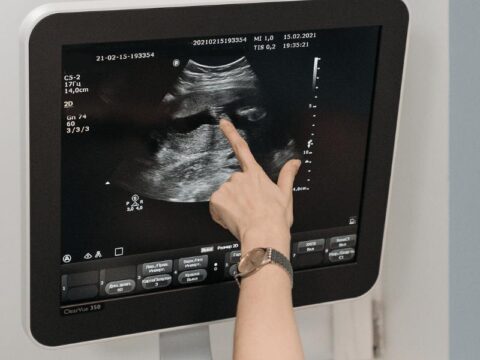What are antenatal tests?
Antenatal tests are an important part of your pregnancy care and help make sure that you and your baby are healthy throughout your pregnancy. Different types of tests, including blood tests, urine tests and ultrasound scans are used to check different aspects of your own and your baby’s health. Some tests are recommended for everyone, while others are offered only to women at a greater risk of a particular condition.
Some antenatal tests are screening tests. This means that they are designed to assess the chance of you or your baby having a particular condition. If you receive a high-risk result on a screening test, you might decide to do a diagnostic test that can tell you for certain whether your baby has that condition.
At your first antenatal visit, your doctor or midwife will explain which antenatal tests are recommended for you and when you should have them.
Which antenatal tests are offered during pregnancy?
There are different types of antenatal tests offered at different times during pregnancy, including blood tests, urine tests, ultrasound scans and special tests.
Here is a summary of some of the antenatal tests routinely offered during pregnancy in Australia:
| Name | Type of test | What does it check for? | When is it done? |
| Infectious disease screen | Blood test | Immunity to infections such as hepatitis, HIV and rubella | First antenatal visit |
| Blood group + antibodies | Blood test | Blood group | First antenatal visit |
| Full blood count | Blood test | Anaemia | First antenatal visit |
| Vitamin D level | Blood test | Vitamin D deficiency | First antenatal visit |
| Urine culture | Urine test | Infection | First antenatal visit May be repeated during pregnancy |
| Dating scan | Ultrasound scan | Estimated due date | 8 – 14 weeks |
| Nuchal translucency test | Ultrasound scan | Screens for genetic abnormalities | 11 – 13 weeks |
| Combined first-trimester screen (CFTS) | Ultrasound scan + blood test | Screens for genetic abnormalities | 11 – 14 weeks |
| Non-invasive prenatal testing (NIPT) | Blood test | Screens for genetic abnormalities | From 10 weeks |
| Chorionic villus sampling (CVS) | Procedure | Diagnoses genetic abnormalities | From 11 weeks |
| Amniocentesis | Procedure | Diagnoses genetic abnormalities | From 15 weeks |
| Morphology scan | Ultrasound scan | Fetal growth and development Position of the placenta | 18 – 20 weeks |
| Gestational diabetes screening | Blood test | Gestational diabetes | 24 – 28 weeks |
| Group B strep screen | Vaginal-rectal swab | Group B strep | 30 – 36 weeks |
Why do I need tests during pregnancy?
Antenatal tests are an important way to check your own and your baby’s health and wellbeing throughout your pregnancy. Antenatal tests can help to:
- pick up medical problems early so they can be treated early
- identify any genetic conditions affecting your baby, so you can decide what to do next
- check that your baby is growing and developing normally
It’s important to do tests at the recommended time to make sure you get the right information to make any necessary decisions. Ask your doctor or midwife if you’re not sure when you need to have a particular test, or why it is recommended for you.
Do I have to have tests and what are my options?
You can choose whether or not to have antenatal tests. You may decide to have all the tests recommended by your doctor or midwife, or only a few.
It’s a good idea to think about the possible results of antenatal testing, and what you might feel when you get the results.
Many women find it helpful to ask questions and discuss their options with their doctor or midwife. Your partner, close family and friends can also help you make choices that are right for you.
Be careful about following advice from the internet or social media since it may not be accurate. Your doctor or midwife can answer your questions and give you accurate information and advice about your situation.
Who will do the tests?
Your doctor or midwife will refer you for any antenatal tests that are recommended for you.
Blood tests are usually done at a pathology collection centre or hospital by a trained pathology collector.
Ultrasound scans are usually performed by a specially-trained technician called a sonographer, but they can be performed by anyone who is trained to do them. This may include doctors, midwives or other health workers. Scans may be performed in a radiology clinic or a hospital.
Procedures such as chorionic villus sampling (CVS) and amniocentesis are done by a specialist doctor in a clinic or hospital.
What do antenatal tests cost?
Medicare covers the cost of many antenatal tests, including ultrasounds and blood tests, but not all of them. You may need to pay an out-of-pocket cost depending on the test and where you get it done. It’s a good idea to ask about fees when you book your appointment.
More information:
Your GP, obstetrician or midwife can answer your questions and give you more information about antenatal tests and discuss the significance of your test results.
Speak to a maternal child health nurse
Call Pregnancy, Birth and Baby to speak to a maternal child health nurse on 1800 882 436 or video call. Available 7am to midnight (AET), 7 days a week.
Source: Pregnancy Birth & Baby, March 2022
Sources: The Royal Australian and New Zealand College of Obstetricians and Gynaecologists (Antenatal care during pregnancy) , The Royal Australian and New Zealand College of Obstetricians and Gynaecologists (Prenatal screening and diagnostic testing for fetal chromosomal and genetic conditions) , Department of Health (Pathology: the facts) , Queensland Government – Department of Health (Ultrasounds during pregnancy) , RANZCOG (Amniocentesis) , Services Australia (Medicare services for conceiving, pregnancy and birth)





